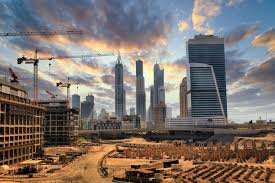The real estate industry in the UAE is a rapidly changing sector, and technology has been driving much of the recent innovation. With new tools and platforms popping up all the time, it’s clear that technology will play an important role in shaping the future of real estate in the UAE. In this article, we will explore how technology is expected to transform the UAE’s real estate industry over the coming years. Real Estate Industry in UAE
Technological Progress:
The real estate industry in UAE is poised to undergo a significant transformation due to technological progress. The adoption of new technologies in the industry is expected to increase efficiency, enhance customer experience, and streamline operations. For instance, blockchain technology can help reduce fraud and increase transparency in property transactions by providing secure and unalterable records.
Artificial intelligence (AI) can also revolutionize the sector by providing insights into market trends, predicting consumer demand and behavior, as well as identifying potential risks. Additionally, virtual reality (VR) technology can enable buyers to tour properties remotely from anywhere in the world without physically visiting them.
In conclusion, technological progress will continue to influence the real estate industry in UAE positively. New advancements are set to transform how business is conducted and provide increased value for customers through improved convenience and better experiences. As such, companies that embrace these technologies stand to gain a competitive advantage over their peers who don’t adopt them.
Advancements & Benefits
Advancements in technology have already begun shifting the landscape of the real estate industry in UAE. The use of virtual and augmented reality, digital property management systems, and online marketplaces are just a few examples that have emerged in recent years. These advancements have brought about numerous benefits to consumers, including easier access to information, better transparency and more efficient processes.
One significant benefit is the ease with which buyers can now remotely view properties through virtual tours. This not only saves time and money but also provides a more immersive experience for buyers who might be unable to visit properties physically. Additionally, digital property management systems enable landlords to manage their properties more effectively by providing real-time monitoring of rental income streams and maintenance needs.
Impact of Technology on Real Estate:
The impact of technology on the real estate industry in UAE is significant and is expected to continue to evolve in the future. With advancements in technology, real estate professionals can now use virtual reality tools to provide clients with immersive experiences of properties they are interested in. This allows potential buyers and renters to view properties without physically being there, saving time and resources.
In addition, online platforms such as property listing websites have revolutionized the way people search for properties to buy or rent. A detailed list of property projects is available on these platforms, along with information about a property’s features, location, price, and availability. They also provide an opportunity for real estate agents to showcase their listings easily and reach a larger audience.
Furthermore, technology has improved communication between clients and agents through chatbots and instant messaging services. With AI-powered chatbots handling routine inquiries from clients, agents can focus on more complex tasks such as negotiating deals with potential buyers or renters. Overall, the implementation of technology has made the real estate industry more efficient and accessible than ever before for both professionals and clients alike.
AI, Blockchain, IoT, AR/VR
The real estate industry in the UAE is experiencing a technological transformation with the adoption of emerging technologies such as AI, Blockchain, IoT, AR and VR. One significant impact is the use of AI in property management. Property managers can now use chatbots to interact with tenants and respond to their queries more effectively.
Blockchain technology is also playing a vital role in facilitating secure transactions between buyers and sellers. Through blockchain-powered platforms, buyers can securely track the transaction progress from start to finish. Similarly, sellers can verify that payments have been made without intermediaries.
In terms of augmented reality (AR) and virtual reality (VR), they offer an immersive experience for buyers who want to view properties remotely. With these technologies, prospective clients can take virtual tours of properties before making any purchase decision. Overall, it’s evident that these emerging technologies are set to transform the UAE real estate industry by streamlining operations and providing innovative solutions that enhance customer experiences.
Challenges to Real Estate Market:
One of the major challenges that the real estate market is facing today is the adoption and integration of technology. With the rapid advancement in technology, people are increasingly relying on digital platforms to search for properties, make transactions, and conduct negotiations. This has led to a shift from traditional brick-and-mortar real estate agencies to online portals and platforms.
Another challenge that the real estate market faces is the increasing demand for sustainable and eco-friendly infrastructure. Homebuyers are becoming more environmentally conscious and looking for properties with energy-efficient features, sustainable materials, and low carbon footprints. The industry must adapt by incorporating green technologies into their projects.
Fluctuating property prices can pose significant challenges to buyers and sellers in the real estate market. A sudden rise or fall in property values can lead to instability in markets as well as economic uncertainty. Professionals in this field need to closely monitor market trends so they can better advise clients when buying or selling properties is best. No doubt, Dubai is the best place for property investment.
Conclusion:
In conclusion, the integration of technology in the real estate industry has brought about significant changes that are set to revolutionize the sector in the UAE. The use of virtual and augmented reality technology is expected to become more prevalent, enabling potential buyers and investors to view properties from different locations without having to physically visit them. This will undoubtedly save time and resources while making transactions faster and more efficient.


